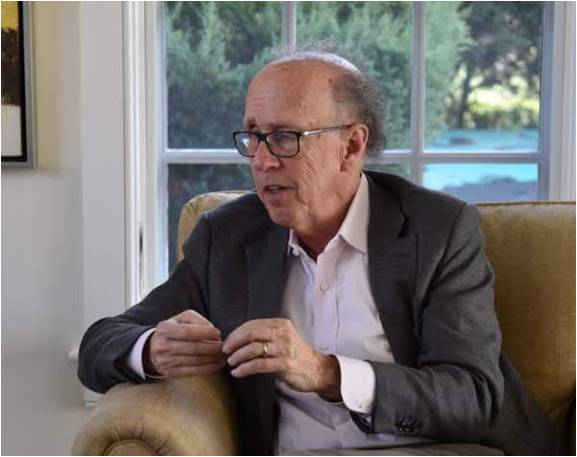

The global economy is in a difficult spot right now, with weak demand as the main problem, Stephen Roach, senior fellow at Yale University and former chief economist of Morgan Stanley told People’s Daily on Friday.
Eight years after the breakout of the financial crisis, global growth remains very weak, especially in the developed world. Total demand in the major developed economies is rising at an anemic pace, as aggressive stimulus policies have largely failed. While monetary easing has stimulated the financial markets, it has not brought about significant boost to demand or the real economy. To outline major economies’ performances, Roach points out that the United States needs to save more and spend less. Currently, the personal savings rate in the U.S. is about 5%, below the average saving rate of 9% in the last 30 years of the twentieth century.
In the past eight years, the average U.S. annual growth rate was 1.5%, while the preceding 12 years witnessed an average 3.6% growth. Given U.S. consumers’ concern over personal debts, America should focus more on household balance sheets.
Roach believes that the Japanese economy has currently slid back to recession. The so-called Abenomics seemingly is not working well at the moment, or at least not as well as initially advertised. The program is supposed to cover monetary, fiscal, and structural reforms. As it turns out, efforts on the monetary front have not been accompanied by structural reform. Japan’s average growth rate over the last three years is 0.7%, not significantly different from the 0.8% average growth rate over the preceding 21 years.
In Mr. Roach’s view, Europe’s economy basically has not grown in the past eight years, as the effects of debt crises in Italy, Portugal, Spain, Greece, and Ireland lingered over continuously. European countries are also saddled with banking problems and consequences of incomplete coordination of fiscal policies. Though the euro has been weakened, it still has not boosted growth.
Roach also points out that China needs to save less and spend more. He believes that the slowing economy reflects two sets of forces. First is the weakness of the world economy, which has a major impact on China’s exports. Second is Beijing’s focus on structural reform which aims to transfer the economy from manufacture-dominated to service-dominated and from exports-and-investment-driven to consumption-driven. Though Roach notes such structural change would inevitably lead to slower growth, he remains “quite optimistic” about China’s economy.
In assessing the policies of the major economies, Roach points out that the EU and Japan have been least successful. China is definitely making advances in shifting its growth model toward consumption. America has not made as much progress as it should have, and has relied too much on monetary stimulus. If the ongoing slowing down of productivity growth is not addressed, “economic performance will continue to be weak.” He suggests that Washington needs to focus more on long-term fiscal policy.
According to Roach, over the last ten years, China’s contribution to the global growth was more than twice that of all the developed economies combined. While China’s slowdown means a reduced impact on global growth, even at a growth rate of 6% China would still be able to contribute more than the developed economies.

Stephen Roach. (People's Daily/Bian Hong)
 Beautiful Kapok flowers bloom in Hainan
Beautiful Kapok flowers bloom in Hainan Eye-catching beauties in Chunxi Road of Chengdu
Eye-catching beauties in Chunxi Road of Chengdu Wedding pictures of Wu Qilong, Liu Shishi released
Wedding pictures of Wu Qilong, Liu Shishi released One of world's largest military drills in Saudi Arabia
One of world's largest military drills in Saudi Arabia Iron lady or goddess? Sportswomen's dress show
Iron lady or goddess? Sportswomen's dress show Versatile female soldiers in military camp
Versatile female soldiers in military camp Top beauties in Chinese provinces
Top beauties in Chinese provinces Follow me to my Weibo
Follow me to my Weibo Chinese ships keep close watch on U.S. Navy aircraft carrier strike group in S. China Sea
Chinese ships keep close watch on U.S. Navy aircraft carrier strike group in S. China Sea Top 20 hottest women in the world in 2014
Top 20 hottest women in the world in 2014 Top 10 hardest languages to learn
Top 10 hardest languages to learn 10 Chinese female stars with most beautiful faces
10 Chinese female stars with most beautiful faces China’s Top 10 Unique Bridges, Highways and Roads
China’s Top 10 Unique Bridges, Highways and Roads How prosperous is the city Beijing really?
How prosperous is the city Beijing really?  China will further open market for foreign firms this year: report
China will further open market for foreign firms this year: report  Influenced by Ai Weiwei, a remote village evolves into a lab for performance artists
Influenced by Ai Weiwei, a remote village evolves into a lab for performance artists  Western speech freedom not fit for China
Western speech freedom not fit for China Day|Week